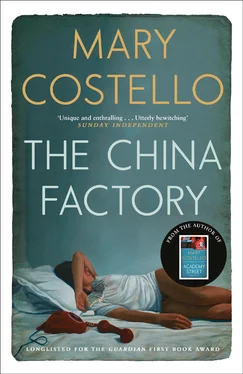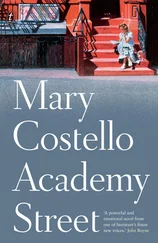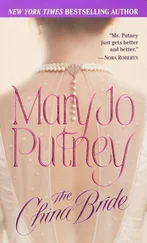‘Tell me your life,’ he whispered. The room was still warm from the day’s heat. Soon, outside, the light would fade.
She smiled. ‘A man broke my heart, once,’ she said quietly.
‘Your husband?’
‘No. Another man. In America… an actor. I met my husband when I came back.’ She gave a little laugh. ‘He insists on loving me… I will never have children.’
‘I’m sorry.’
She stroked his hair.
‘Did you get over him? The American guy?’
She looked past him. ‘When I came back I stayed at my mother’s. I used to walk the lanes. It was summer then. One evening I took her car and drove for miles. When I returned I parked in the local churchyard, at the back, under the yew trees. I thought, This is where people come on summer evenings to do away with themselves. But I just sat there. I was so pierced… I thought we were predestined.’
She took his hand and led him to the bed. She removed his shoes. The charge was immense. The light in the room had changed and he was reminded of midsummer evenings in childhood when daylight vanished and a certain kind of sadness fell on him. She raised her face to him, her throat, the tender place on her temple that he wanted to touch. He saw her eyes, saw that something in her had been extinguished. Who did this to you? he wanted to say. He took her in his arms and covered her with his whole body, with the soles of his feet. ‘Go deep,’ she whispered.
They lay side by side looking up at the ceiling. He heard the rumble of the city in the distance. She had made him feel vast. He had to hold back words, thoughts, search for other words that might bear their weight. He remembered something from the radio that day, about how the skies are full of old junk, thousands of space shuttles and old Russian satellites that are breaking up and falling to earth as debris. Pieces the size of a family car could come crashing down on one’s house. He turned to tell her this. Her eyes were on him, full and moist and desolate.
‘He only liked the beginnings of things,’ she whispered. ‘He used to hit me… He was so broken. It made me love him more.’
Twilight came. He had an urge to carry her to the car and drive off with her. Gradually, beside him, he felt her grow remote. She stepped from beneath the sheet and crossed the room. The light came on in the bathroom and the door closed softly. Then the shower was running. He looked at the shapes in the room, the TV screen, the lamps, the armchairs. He waited a long time. He knew then that she wanted him gone. He rose and dressed and went down in the lift, his legs barely able to ferry him. Out in the evening he felt sick in his stomach. The orange streetlights made everything eerie. He drove along empty streets where the trees hung low. He did not know his way out of the city. He stopped and sat in a café under harsh lights and stared at his reflection in the plate-glass window. He thought of her back in the hotel room, sitting in front of the mirror, brushing her hair in long, even strokes.
The horizon turned black as he drove west. He imagined forks of lightning striking the road, lighting up the way ahead. He opened the window and cold air streamed in and he accelerated hard and closed his eyes for a few seconds. It did not matter if he never reached home. He knew what awaited him, what had to be got through. He knew the water in the bay and every city street and every tree on his road. He knew his own driveway and the front door where his key fitted and the sound of his step on the stairs and the smell of the warm sheets rising to meet him. He pictured himself sitting on the edge of the bed, his weight sagging as he bent down and took off his shoes. He thought how such small things — untying shoelaces, undressing — or the thought of such things, could unhinge a man.
Lights were coming up across the river, on the marina, in the hotel, and soon they would rise from the town and reflect on the water. He felt a little chill. He crossed the damp grass and went inside. They had put a small table in his mother’s room, with a white cloth and a crucifix and two lighted candles. He listened to his mother’s breath, shortening. He laid his fingers on her pulse and rested them there and felt himself weaken in a moment of terrible tenderness, of mercy. He felt it in his arms, caritas , a love for her greater now than at any moment in his whole life. Suddenly, she opened her eyes wide and stared, frightened, at something at the foot of the bed. He whispered Momma , and moved to that spot and for one long beautiful moment he thought she was back, that it was all a mistake and in the next moment she would sit up and be whole again, and elated. But her eyes looked through him, seeing something beyond him.
The building was quiet. He thought he should whisper something in her ear. Her lungs were rattling, filling up with liquid. Soon they would be full. When it happened, when the moment arrived, her little breaths petered out in one long exhalation, and he held his own until it ceased.
He sat there for a long time feeling it was neither day nor night. Something remained, drifting in the room. She had been long gone before tonight, long exiled. He had lived in an exile of his own too, in recent years. He closed his eyes now. Mona had made his home. She had made his children, inside her. He turned his head to where his mother’s slippers sat on the floor. The sight of them, their patient waiting, moved him. He bent down and took them on his lap and put a hand inside each one. His heart began to pound. He had given Mona the whole of his life, the days, the hours, the quotidian. Every single day, but one. She would have him beyond this life too. Their bones would lie in the same grave and lean against each other and calcify in the earth together. What more could she want? What more could he give?
He was still for a long time. He did not know if this moment counted for everything or almost nothing. He drove west into the night. On the radio a piano was playing, single high notes, marvellous and pure, like the ringing of delicate bells. Their tinkle, their ambulation, tapped on his soul and made it soar.
Last summer I heard she was out. She was seen down by the lake late in the evenings, her grey hair down to her backside. Or coming out of the local shop with her groceries in a cloth bag, her eyes cast down as she pushed her bicycle out of the village. She spoke to no one. Though I pictured her standing at the shop counter pointing a finger and saying loaf, tea in an abrupt voice, then thrusting a twenty-euro note at the shopkeeper in an outstretched hand.
One evening I drove over by the lake and parked in the pub car park. I thought I might glimpse her head bobbing above the hedge on the lane leading down to the water. The place is popular with anglers, and as I waited a couple of Englishmen strolled up the lane, opened their jeeps, lifted in their catch. When the light began to fade I drove away.
After forty years hidden from view she had become a curiosity to the locals, to me too. I imagined her leaning in over the lake, gazing at her green watery reflection, her long hair breaking the surface. I drove by her house that evening. There was no sign of life. I turned the car around and just past the bend I saw the figure up ahead on foot, crossing the road from the lane, bearing down on a bicycle. I slowed down and we looked at each other. Her face was white, her cheeks hollow. I let down the window and she came close up to the car and wiped her mouth roughly with the back of her hand. Her eyes narrowed. Then, with a bewildered look, she jerked her head away fiercely and scurried off. I stared in the rear-view mirror after her. I knew she had not forgotten me.
‘Claude… That’s a strange name for around here,’ she said. It was late and we were sitting on a low wall outside the dancehall in the local town. Her hair was dark and silken. She had just qualified as a nurse.
Читать дальше












